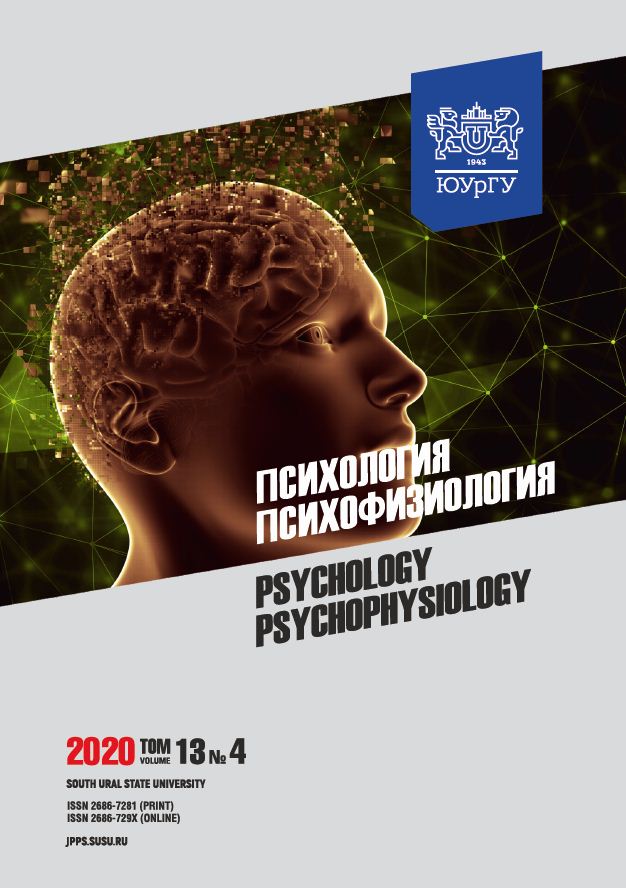ADAPTIVE RESOURCES OF SUBJECTS WITH DIFFERENT STRATEGIES FOR CHOOSING A WAY OF LIFE IN A STRESS SITUATION OF ORGANIZATIONAL CHANGES
Abstract
Background. The modern world is characterized by instability, uncertainty, complexity and ambiguity. Therefore, a successful development of an organization requires organizational changes, which provoke the necessity of adaptation for people working in this organization. The study of specific adaptive resources revealed the benefits of a differentiated approach to personnel undergoing organizational changes. The differentiation of the sample depending on the strategies for choosing a way of life is justified. Aim. The paper aims to study the specifics of adaptive resources in the context of organizational changes and the features of experiencing stress, tolerance to uncertainty and resilience. Materials and methods. The study involved 208 employees of a large industrial enterprise in Chelyabinsk (of which 135 females and 73 males). The following methods were used during the study: typology for a personal choice of a way of life by V. Gryazeva-Dobshinskaya, A.S. Maltseva; the Psychological Stress Measure (PSM) by L. Lemyrr, R. Tessier, L. Fillion (adapted by N.E. Vodopyanova); the Hardiness test by S. Maddi (adapted by D. A. Leontiev, E. V. Rasskazova); the tolerance to uncertainty scale adapted by E.G. Lukovitskaya. For statistical processing, discriminant and factor analysis were used. Results. General (nonspecific) adaptive resources were revealed: in all subjects regardless of their strategies for choosing a way of life, an inverse correlation was found between stress exposure and resilience as stress resistance resources. Specific adaptive resources were identified: subjects of a hedonistic type had a positive attitude towards new, diverse situations in life and were characterized by a preference for uncertainty; subjects of a value-oriented type were characterized by an arbitrary level of attitude to uncertain and complex situations; creative subjects demonstrated a set of properties, including “challenge” and all the components of “uncertainty tolerance”.
Downloads
References
2. Vasilyuk, F.E. Psikhotekhniki vybora [Psychotechnics of choice]. Psikhologiya s che-lovecheskim litsom: gumanisticheskaya perspektiva v postsovetskoi psikhologii [Psychology with a human face: a humanistic perspective in post-Soviet psychology]. Ed. D.A. Leontieva, V.G. Shur, Moscow, Smysl, 1997, pp. 294–314. (in Russ.).
3. Vodopyanova N.E. Psikhodiagnostika stressa [Psychodiagnosis of stress]. Moskow, Piter, 2009, 336 p. (in Russ.).
4. Gryazeva-Dobshinskaya V.G., Maltseva A.S. Test “Typology of Personal Career Choices”: Description and Psychometric Verification Results. Bulletin of the South Ural State University. Ser. Psychology. 2016, vol. 9, no. 2, pp. 14–21. (in Russ.). DOI: 10.14529/psy160202.
5. Guseltseva M.S. Kulturnaya psikhologiya: metodologiya, istoriya, perspektivy [Cultural psychology: methodology, history, prospects]. Moscow, Pabl. Prometei, 2007. 292 p. (in Russ.).
6. Zinchenko V.P. [Tolerance towards vagueness: is it news or a psychological tradition?]. Voprosy psikhologii [Psychology issues], 2007, no. 6, pp. 3–20. (in Russ.).
7. Kaneman D., Slonik P., Tverski A. Prinyatie reshenii v neopredelennosti: Pravila i predubezhdeniya [Decision Making in Uncertainty: Rules and Prejudices]. Kharkiv, Publishing House Institute of Applied Psychology “Humanitarian Center”, 2005, 632 p. (in Russ.).
8. Leontev D.A. [Personal in personality: personal potential as the basis for self-determination]. Uchenye zapiski kafedry obshchei psikhologii MGU im. M.V. Lomonosova [Scientific notes of the Department of General Psychology, Moscow State University M.V. Lomonoso-va], 2002, no. 1, pp. 56–65. (in Russ.).
9. Makgonigal K. Khoroshii stress kak sposob stat silnee i luchshe [Good stress as a way to get stronger and better]. Mosсow, Alpina Pablisher, 2018. 304 p. (in Russ.).
10. Osin E.N. [Factor structure of the Russian version of the scale of general tolerance to uncertainty D. MacLane]. Psikhologicheskaya diagnostika [Psychological diagnosis], 2010, no. 2, pp. 65–86. (in Russ.).
11. Petrovskii V.A. Psikhologiya neadaptivnoi aktivnosti [Psychology of non-adaptive activity]. Mosсow, Pabl. Gorbunok, 1992. 224 p. (in Russ.).
12. Kornilova T.V., Chumakova M.A., Kornilov S.A., Novikova M.A. Psychology of uncertainty: unity of intellectual and personal potential of a person [Psychology of uncertainty: the unity of the intellectual and personal potential of a person]. Moscow, Smysl, 2010. 334 p. (in Russ.).
13. Timoshchenko A.S., Gryazeva-Dobshinskaya V.G., Kadysheva M.V. Creative Leadership of Teachers as a Resource of Pedagogical Influence. Ser. Psychology. 2019, vol. 12, no. 1, pp. 83–91. (in Russ.). DOI: 10.14529/psy190108
14. Bennis W., Nanus B. Leaders: the strategics of taking charge. New York, Harper & Row, 1985. 244 p.
15. Frenkel-Brunswick E. Intolerance of ambiguity as an emotional and perceptual personality variable. Journal of Personality, 1949, vol. 11 (1), pp. 108−143.
16. Kobasa S.C., Maddi S.R., Kahn S. Hardiness and health: A prospective study. Journal of Personality and Social Psychology, 1982, vol. 42 (1), pp. 168–177. DOI: 10.1037/0022-3514.42.1.168.
17. Spielberger C.D. State-Trait Anxiety Inventory: A comprehensive bibliography. Palo Alto, CA, Consulting Psychologists Press, 1983.
18. Maddi S., Khoshaba D., Persico M. et al. The personality construct of hardiness, II: Relationships with comprehensive tests of personality and psychopathology. Journal of Research in Personality, 2002, Vol. 36, pp. 72–85. DOI: 10.1006/jrpe.2001.2337
References on translit
-


